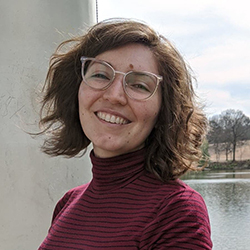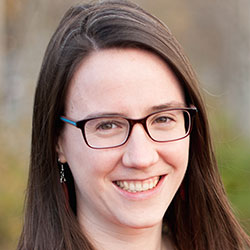Designing “Purpose-first” Programming Approaches
Kathryn Cunningham discussed her work applying human-computer interaction methods to support the needs and goals of computing students at the undergraduate level.
An emerging trend within computer science education is the massive growth in course enrollment fueled by non-major students who realize the value of applying computational and data processing skills across fields.
 “Computing is becoming a universal literacy,” said Kathryn Cunningham, Computing Innovation Fellow and postdoctoral scholar in computer science at Northwestern Engineering. “Just like some type of mathematics is crucial for most students to know, no matter their future outcomes, computing is becoming more and more critical for most students.”
“Computing is becoming a universal literacy,” said Kathryn Cunningham, Computing Innovation Fellow and postdoctoral scholar in computer science at Northwestern Engineering. “Just like some type of mathematics is crucial for most students to know, no matter their future outcomes, computing is becoming more and more critical for most students.”
Cunningham studies inequities and barriers in computing education and designs programming approaches to support students at the undergraduate level that have increasingly diverse goals, backgrounds, computing interests and experience, and academic confidence.
On December 8, 2021, Cunningham presented the virtual lecture “Diversifying Pathways to Computer Science Education” as part of the computer science seminar series.
Cunningham presented examples of computing education innovations she developed to support undergraduate student success and to inspire a broader set of learners to study code, including female non-majors and low-income community college transfer students.
Cunningham conducts research that incorporates concepts from program comprehension, cognitive science, and educational psychology with the Delta Lab, an interdisciplinary research lab and design studio at Northwestern focused on social and crowd computing, human-computer interaction, learning sciences, civics, and innovation. She is also a member of the Center for Human-Computer Interaction + Design (HCI+D), a collaboration between the McCormick School of Engineering and the School of Communication.
 “Katie is asking really important questions about how we can support the wide variety of students who are taking computer science classes. Her innovations have changed how I think about pathways for new students by demonstrating the value of starting with code's purpose before digging into low-level implementation details, which is a big shift from how most introductory courses are designed right now,” said Eleanor O'Rourke, June and Donald Brewer Junior Professor in Computer Science and the Learning Sciences in Northwestern Engineering and the School of Education and Social Policy. O’Rourke is Cunningham’s mentor and postdoctoral adviser.
“Katie is asking really important questions about how we can support the wide variety of students who are taking computer science classes. Her innovations have changed how I think about pathways for new students by demonstrating the value of starting with code's purpose before digging into low-level implementation details, which is a big shift from how most introductory courses are designed right now,” said Eleanor O'Rourke, June and Donald Brewer Junior Professor in Computer Science and the Learning Sciences in Northwestern Engineering and the School of Education and Social Policy. O’Rourke is Cunningham’s mentor and postdoctoral adviser.
O’Rourke co-directs the Delta Lab with Matt Easterday, Liz Gerber, and Haoqi Zhang and is a founding faculty member of Northwestern's joint PhD program in Computer Science and Learning Sciences (CS+LS).
Purpose-first programming
Cunningham first discussed a goal-oriented or “purpose-first” interactive system she built to support conversational programmers, or people who need high-level, application-focused information about computing programs but aren’t necessarily interested in writing or editing code, such as product managers, designers, entrepreneurs, or technology journalists.
She developed a novel proof of concept curriculum system to address the challenge of balancing user need for complex knowledge about authentic tasks in programming and software systems within a short time frame. By using domain-specific, pattern-based code examples annotated with instructions that highlight the purpose of the code, learners were able to write, tailor, and debug code, and explain the program activity after just 30 minutes of instruction.
“The approach is designed for learners who care more about what code can achieve for them than how a programming language works,” Cunningham said. “And it’s motivating because students have a sense of success and alignment with their particular learning goals.”
Rejecting code tracing
Next, Cunningham presented work related to understanding why students reject the practice of code tracing — or simulating the execution of code either manually or through program visualization tools — and considering whether code tracing is an appropriate task for student groups that value the creation of code more than understanding how code works.
Because tracing activities are both cognitively challenging and often involve contextless problems without a defined purpose, Cunningham applied an expectancy-value model to better understand students’ motivation to use or reject code tracing and the thought processes behind their choices.
“Students had a pretty well-developed way of connecting beliefs about themselves to their decision not to trace code,” Cunningham said. “They connected their self-beliefs to not only why it was they didn’t feel like they would be successful, but also the reason they assigned low value to the task.”
Cohort pathways
Finally, Cunningham discussed the opportunities of broadening participation in computing by addressing current barriers to underrepresented transfer students from community colleges.
As the computer science education coordinator for the CSin3 program — a partnership between the Matsui Foundation, Hartnell College and California State University Monterey Bay — Cunningham and her team built a support structure for students to earn a bachelor’s degree in computer science in three years.
“We were focusing on students, learning what they need, and building a better pathway,” Cunningham said.
The program solved common transfer student obstacles through features such as a pre-defined course schedule, batch registration, designated study space on campus, tutoring, and enrichment activities designed for career preparation. The average graduation rate was 71 percent for the first two CSin3 cohorts and 82 percent of the first cohort secured jobs within two months of graduation.
Future Work
Cunningham plans to build on her work with alternative education pathways by designing platforms and learning environments and scaling best practices to support communities of non-traditional students.
“My vision is to diversify and scale pathways to computing education,” she said.
Cunningham received her PhD in information from the University of Michigan, her MSc in computer science (human-centered computing) from Georgia Tech, and her BS in computer science and molecular and cellular biology from the University of Arizona.
